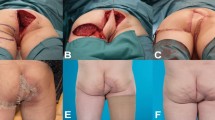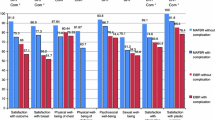Abstract
Background
To obtain a clear surgical margin, abdominoperineal excision (APE) for rectal cancer frequently leaves a large perineal defect surrounded by irradiated tissue. A vertical rectus abdominis myocutaneous (VRAM) flap may facilitate healing of this wound. The current study aims to determine the effect of VRAM flap perineal reconstruction following APE on patient quality of life (QOL).
Methods
This is a retrospective cohort study from a prospectively collected database. Data on QOL were assessed via telephone questionnaire using the European Organization for Research and Treatment of Cancer Quality of Life Questionnaire (EORTC QLQ)-C30, EORTC QLQ-C29 and the Cleveland Clinic QOL questionnaires.
Results
Twenty-seven patients underwent primary perineal closure, and 12 patients underwent a VRAM flap perineal reconstruction. The mean duration of follow-up was 16.8 months. Overall, there was no significant difference in the Cleveland Clinic QOL score between groups (VRAM vs. no VRAM: 0.7 ± 0.2 vs. 0.7 ± 0.2, p 0.735). Patients in the VRAM group had lower levels of fatigue (5.5 ± 9.9 vs. 23.6 ± 19.2, p 0.004). Patients in the VRAM group had reduced sore skin scores around the stoma site (11.0 ± 16.2 vs. 31.8 ± 31.1, p 0.036). VRAM flap was associated with an increased incidence of abdominal wall hernia (VRAM vs. no VRAM: 25 % vs. 0 %, p 0.024).
Conclusions
This study is limited by its non-randomized retrospective design and relatively small sample size. A significant difference in patient QOL was not demonstrated between VRAM flap and primary perineal closure after APE for rectal cancer. Further studies in this area are warranted.
Similar content being viewed by others
References
Morris E, Haward RA, Gilthorpe MS, Craigs C, Forman D (2006) The impact of the Calman-Hine report on the processes and outcomes of care for Yorkshire’s colorectal cancer patients. Br J Cancer 95:979–985
Burke JP, Coffey JC, Boyle E, Keane F, McNamara DA (2013) Early outcomes for rectal cancer surgery in the Republic of Ireland following a national centralization program. Ann Surg Oncol 20:3414–3421
Christensen HK, Nerstrøm P, Tei T, Laurberg S (2011) Perineal repair after extralevator abdominoperineal excision for low rectal cancer. Dis Colon Rectum 54:711–717
John HE, Jessop ZM, Di Candia M, Simcock J, Durrani AJ, Malata CM (2013) An algorithmic approach to perineal reconstruction after cancer resection-experience from two international centers. Ann Plast Surg 71:96–102
Butler CE, Gündeslioglu AO, Rodriguez-Bigas MA (2008) Outcomes of immediate vertical rectus abdominis myocutaneous flap reconstruction for irradiated abdominoperineal resection defects. J Am Coll Surg 206:694–703
Chessin DB, Hartley J, Cohen AM et al (2005) Rectus flap reconstruction decreases perineal wound complications after pelvic chemoradiation and surgery: a cohort study. Ann Surg Oncol 12:104–110
Creagh TA, Dixon L, Frizelle FA (2012) Reconstruction with vertical rectus abdominus myocutaneous flap in advanced pelvic malignancy. J Plast Reconstr Aesthet Surg 65:791–797
Butler CE, Rodriguez-Bigas MA (2005) Pelvic reconstruction after abdominoperineal resection: is it worthwhile? Ann Surg Oncol 12:91–94
Chan S, Miller M, Ng R et al (2010) Use of myocutaneous flaps for perineal closure following abdominoperineal excision of the rectum for adenocarcinoma. Colorectal Dis 12:555–560
Barker T, Branagan G, Wright E, Crick A, McGuiness C, Chave H (2013) Vertical rectus abdominis myocutaneous flap reconstruction of the perineal defect after abdominoperineal excision is associated with low morbidity. Colorectal Dis 15:1177–1183
Lefèvre JH, Parc Y, Kernéis S et al (2009) Abdomino-perineal resection for anal cancer: impact of a vertical rectus abdominis myocutaneous flap on survival, recurrence, morbidity, and wound healing. Ann Surg 250:707–711
Daigeler A, Simidjiiska-Belyaeva M, Drucke D et al (2011) The versatility of the pedicled vertical rectus abdominis myocutaneous flap in oncologic patients. Langenbecks Arch Surg 396:1271–1279
Berger JL, Westin SN, Fellman B et al (2012) Modified vertical rectus abdominis myocutaneous flap vaginal reconstruction: an analysis of surgical outcomes. Gynecol Oncol 125:252–255
McArdle A, Bischof DA, Davidge K, Swallow CJ, Winter DC (2012) Vaginal reconstruction following radical surgery for colorectal malignancies: a systematic review of the literature. Ann Surg Oncol 19:3933–3942
Weiwei L, Zhifei L, Ang Z, Lin Z, Dan L, Qun Q (2009) Vaginal reconstruction with the muscle-sparing vertical rectus abdominis myocutaneous flap. J Plast Reconstr Aesthet Surg 62:335–340
Aaronson NK, Ahmedzai S, Bergman B et al (1993) The European Organization for Research and Treatment of Cancer QLQ-C30: a quality-of-life instrument for use in international clinical trials in oncology. J Natl Cancer Inst 85:365–376
Whistance RN, Conroy T, Chie W et al (2009) Clinical and psychometric validation of the EORTC QLQ-CR29 questionnaire module to assess health-related quality of life in patients with colorectal cancer. Eur J Cancer 45:3017–3026
Fazio VW, O’Riordain MG, Lavery IC et al (1999) Long-term functional outcome and quality of life after stapled restorative proctocolectomy. Ann Surg 230:575–584 (discussion 584–596)
Hinojosa MW, Parikh DA, Menon R, Wirth GA, Stamos MJ, Mills S (2009) Recent experience with abdominal perineal resection with vertical rectus abdominis myocutaneous flap reconstruction after preoperative pelvic radiation. Am Surg 75:995–999
Peacock O, Pandya H, Sharp T et al (2012) Biological mesh reconstruction of perineal wounds following enhanced abdominoperineal excision of rectum (APER). Int J Colorectal Dis 27:475–482
Aboian E, Winter DC, Metcalf DR, Wolff BG (2006) Perineal hernia after proctectomy: prevalence, risks, and management. Dis Colon Rectum 49:1564–1568
Kuntscher MV, Mansouri S, Noack N, Hartmann B (2006) Versatility of vertical rectus abdominis musculocutaneous flaps. Microsurgery 26:363–369
Campbell CA, Butler CE (2011) Use of adjuvant techniques improves surgical outcomes of complex vertical rectus abdominis myocutaneous flap reconstructions of pelvic cancer defects. Plast Reconstr Surg 128:447–458
Corte H, Lefèvre JH, Dehnis N et al (2011) Female sexual function after abdominoperineal resection for squamous cell carcinoma of the anus and the specific influence of colpectomy and vertical rectus abdominis myocutaneous flap. Colorectal Dis 13:774–778
Hultman CS, Sherrill MA, Halvorson EG et al (2010) Utility of the omentum in pelvic floor reconstruction following resection of anorectal malignancy: patient selection, technical caveats, and clinical outcomes. Ann Plast Surg 64:559–562
Howell AM, Jarral OA, Faiz O, Ziprin P, Darzi A, Zacharakis E (2013) How should perineal wounds be closed following abdominoperineal resection in patients post radiotherapy—primary closure or flap repair? Best evidence topic (BET). Int J Surg 11:514–517
Foster JD, Pathak S, Smart NJ et al (2012) Reconstruction of the perineum following extralevator abdominoperineal excision for carcinoma of the lower rectum: a systematic review. Colorectal Dis 14:1052–1059
Conflict of interest
None.
Author information
Authors and Affiliations
Corresponding author
Rights and permissions
About this article
Cite this article
O’Dowd, V., Burke, J.P., Condon, E. et al. Vertical rectus abdominis myocutaneous flap and quality of life following abdominoperineal excision for rectal cancer: a multi-institutional study. Tech Coloproctol 18, 901–906 (2014). https://doi.org/10.1007/s10151-014-1156-6
Received:
Accepted:
Published:
Issue Date:
DOI: https://doi.org/10.1007/s10151-014-1156-6




